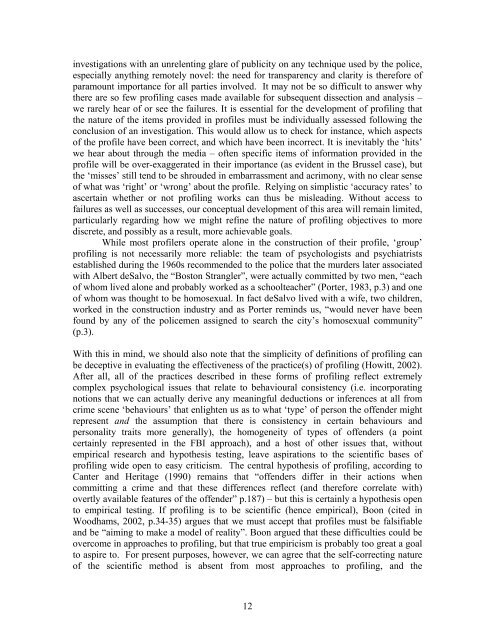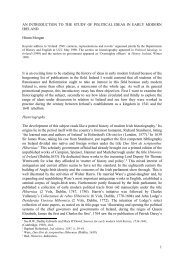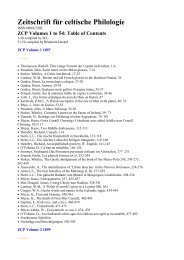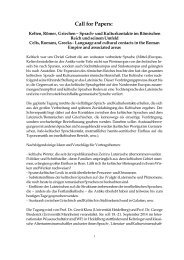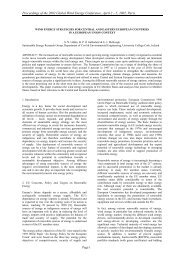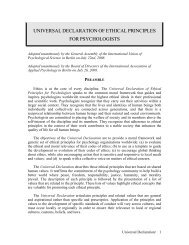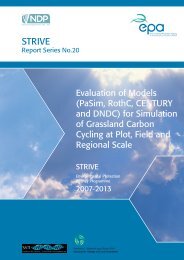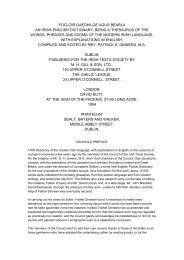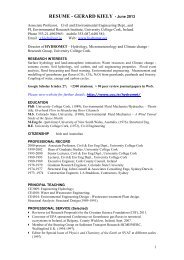Understanding Criminal Behaviour: Beyond Red Dragon - University ...
Understanding Criminal Behaviour: Beyond Red Dragon - University ...
Understanding Criminal Behaviour: Beyond Red Dragon - University ...
Create successful ePaper yourself
Turn your PDF publications into a flip-book with our unique Google optimized e-Paper software.
investigations with an unrelenting glare of publicity on any technique used by the police,<br />
especially anything remotely novel: the need for transparency and clarity is therefore of<br />
paramount importance for all parties involved. It may not be so difficult to answer why<br />
there are so few profiling cases made available for subsequent dissection and analysis –<br />
we rarely hear of or see the failures. It is essential for the development of profiling that<br />
the nature of the items provided in profiles must be individually assessed following the<br />
conclusion of an investigation. This would allow us to check for instance, which aspects<br />
of the profile have been correct, and which have been incorrect. It is inevitably the ‘hits’<br />
we hear about through the media – often specific items of information provided in the<br />
profile will be over-exaggerated in their importance (as evident in the Brussel case), but<br />
the ‘misses’ still tend to be shrouded in embarrassment and acrimony, with no clear sense<br />
of what was ‘right’ or ‘wrong’ about the profile. Relying on simplistic ‘accuracy rates’ to<br />
ascertain whether or not profiling works can thus be misleading. Without access to<br />
failures as well as successes, our conceptual development of this area will remain limited,<br />
particularly regarding how we might refine the nature of profiling objectives to more<br />
discrete, and possibly as a result, more achievable goals.<br />
While most profilers operate alone in the construction of their profile, ‘group’<br />
profiling is not necessarily more reliable: the team of psychologists and psychiatrists<br />
established during the 1960s recommended to the police that the murders later associated<br />
with Albert deSalvo, the “Boston Strangler”, were actually committed by two men, “each<br />
of whom lived alone and probably worked as a schoolteacher” (Porter, 1983, p.3) and one<br />
of whom was thought to be homosexual. In fact deSalvo lived with a wife, two children,<br />
worked in the construction industry and as Porter reminds us, “would never have been<br />
found by any of the policemen assigned to search the city’s homosexual community”<br />
(p.3).<br />
With this in mind, we should also note that the simplicity of definitions of profiling can<br />
be deceptive in evaluating the effectiveness of the practice(s) of profiling (Howitt, 2002).<br />
After all, all of the practices described in these forms of profiling reflect extremely<br />
complex psychological issues that relate to behavioural consistency (i.e. incorporating<br />
notions that we can actually derive any meaningful deductions or inferences at all from<br />
crime scene ‘behaviours’ that enlighten us as to what ‘type’ of person the offender might<br />
represent and the assumption that there is consistency in certain behaviours and<br />
personality traits more generally), the homogeneity of types of offenders (a point<br />
certainly represented in the FBI approach), and a host of other issues that, without<br />
empirical research and hypothesis testing, leave aspirations to the scientific bases of<br />
profiling wide open to easy criticism. The central hypothesis of profiling, according to<br />
Canter and Heritage (1990) remains that “offenders differ in their actions when<br />
committing a crime and that these differences reflect (and therefore correlate with)<br />
overtly available features of the offender” p.187) – but this is certainly a hypothesis open<br />
to empirical testing. If profiling is to be scientific (hence empirical), Boon (cited in<br />
Woodhams, 2002, p.34-35) argues that we must accept that profiles must be falsifiable<br />
and be “aiming to make a model of reality”. Boon argued that these difficulties could be<br />
overcome in approaches to profiling, but that true empiricism is probably too great a goal<br />
to aspire to. For present purposes, however, we can agree that the self-correcting nature<br />
of the scientific method is absent from most approaches to profiling, and the<br />
12


